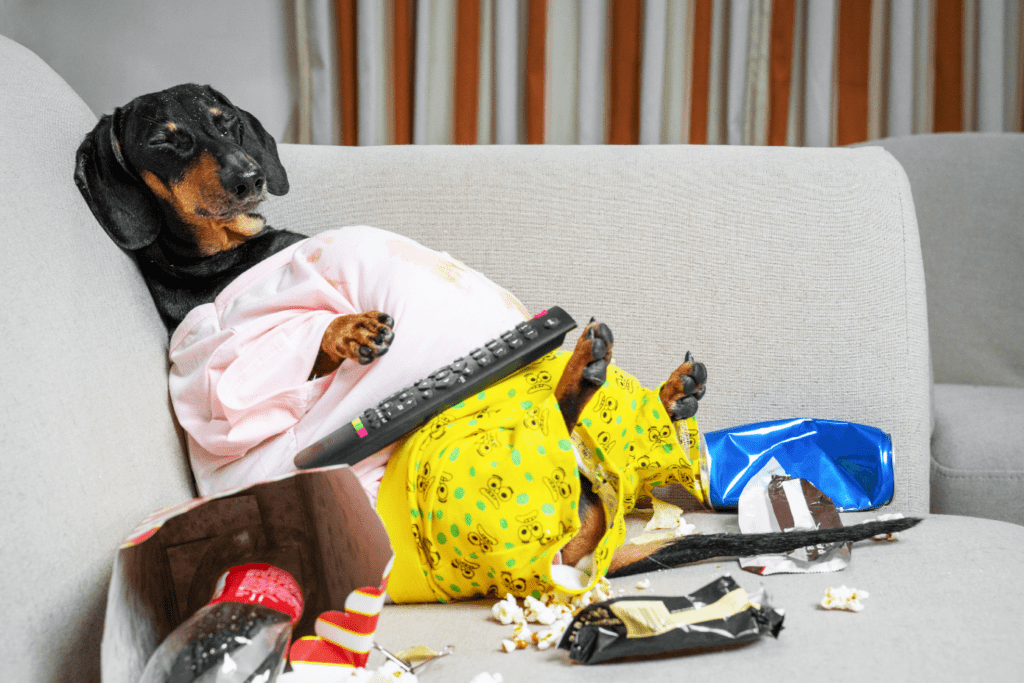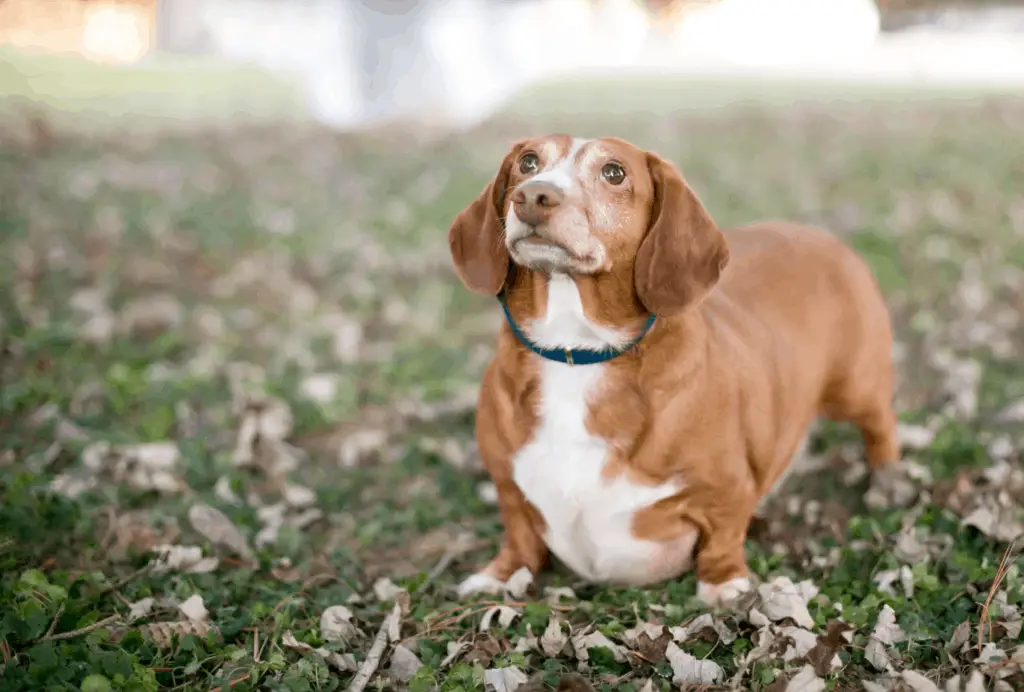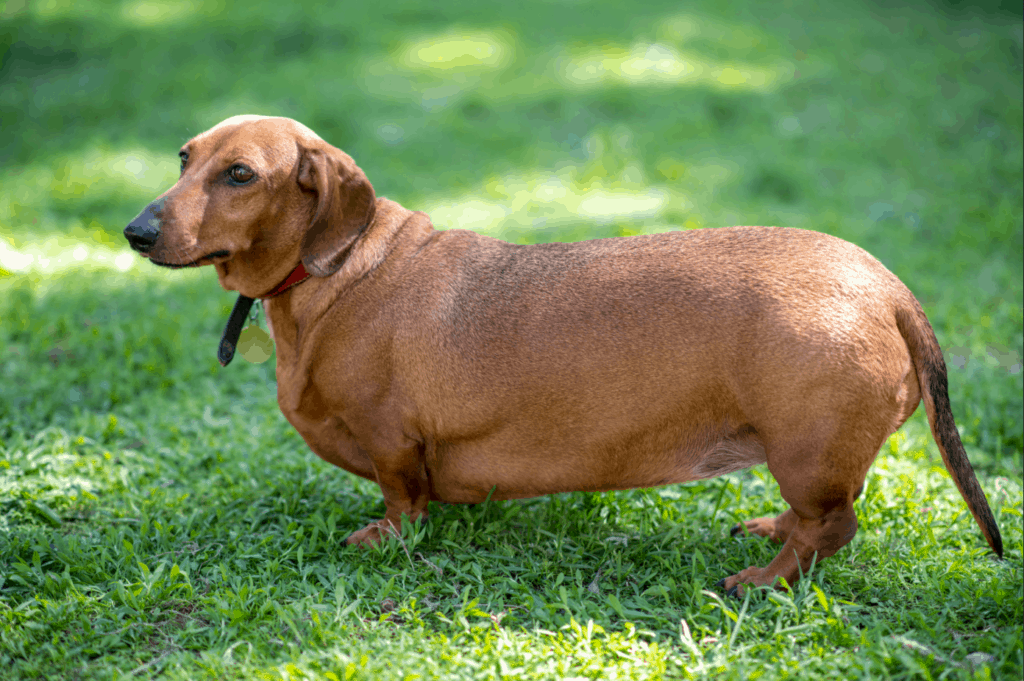
Why won’t my dachshund lose weight?
Dachshunds are tricksters and can easily get their way, so spoiling or pampering them with excessive food is not that difficult. But, however tempting it might be to feed extra treats to your dog, bear in mind that obesity is extremely harmful to these active dogs. So, if you want to avoid ending up with an overweight Dachshund, or help your doxie lose weight read on to find out how it is done.
How to Tell if Your Dachshund Is Overweight
Dachshunds come in many sizes, and hence, the average healthy weight varies. For standard Dachshunds that have reached adulthood, the weight should not be more than 32 pounds. Adult mini Dachshunds, on the other hand, must weigh less than 11 pounds.
And then there are tweenie Dachshunds, which are somewhat between the mini and the standard. If you have one of these, make sure the weighing scale does not go past 15 pounds. The last variety is the toy Dachshund, which should weigh 8 pounds at the most.
If you have not been measuring the weight, there are other ways to tell if your Dachshund is overweight. Look for signs of slow walking, the stomach area touching the ground when they walk, or not being able to feel any bones when you hug them. Yes, all of this means your dog is overweight.
Related Post: Is Your Dachshund Overweight?
Weight Loss Tips for Dachshunds
Once you have ascertained that your doxie is overweight, you must immediately spring into action. Here are some ideas about how to help your overweight Dachshund get back to normal again.
Quality Food
When it comes to losing weight, it is not enough to reduce the quantity of food. What you must look for is the quality of the food your Dachshund is ingesting.
If you buy your dog food at a pet store, be a smart label reader. Look for foods that contain a generous amount of meat, fiber, and more natural ingredients. Alternatively, you can make dog food at home after consulting the vet about the right kind of diet.
Some Dachshunds are sensitive to some foods and/or need supplementation. Talk to your vet about good-quality supplements for your pet.
Click here to find the best food for your Dachshund
Feeding Schedules and Portions
If your Dachshund is just a pup, you must give it three meals a day in small portions. The portions are usually mentioned on the box of the dog food or charted by your vet.
As your doxie grows into an adult, reduce the number of meals to two a day. Reduce protein intake, too. For older Dachshunds, continue to follow the two-meal-a-day rule, but look for foods that are richer in fiber. You may also need to reduce portions at this age.
Regardless of age, you must ensure that your Dachshund does not gulp down food. There are several slow-feeder bowls you can purchase for this purpose.
No Feeding of Table Scrubs
You are sitting down at the table for lunch, and your Dachshund sits silently by your chair, looking up at you with those adorable eyes as if to say, “Can I have a piece of that cake?”. And, of course, you give in and feed it your table scraps.
Thus begins your doxie’s affinity toward human food, and it is hard to stop. Before you know it, your dog is obese. Hence, you must avoid feeding your dog table scraps at any cost. Give it something else to distract itself from your food while you are sitting down for lunch.
Exercise
This one probably goes without saying, but your Dachshund needs exercise to burn off the fat. If you do not exercise enough, your dog will tend to continue to eat and sleep, thus getting fatter by the day.
Take your cute doxie out on a walk on glorious days. A moderately paced walk of 15-20 minutes is all that your pet needs.
When the weather is bad, make your doxie exercise at home through active indoor games. But make sure you give your Dachshund enough breaks in between playtimes because too much exercise can hurt the dog’s sensitive back.
Related post: Dachshund Feeding and Excercise Guide

Why Your Dachshund Cannot Lose Weight
If you have tried all the tips above, including changing your dog’s food habits and exercising regularly, and somehow still cannot get your doxie to lose weight, there must be something else going on. Here are some other factors that may contribute to your dog’s obesity.
Hormones
Hormonal imbalances in dogs affect many functionalities in their bodies and can be a primary cause of obesity. One such hormonal ailment is hypothyroidism. If your doxie cannot lose weight, you may want to test its thyroid glands.
Another commonly developed hormonal imbalance is the over-production of cortisol. Excess cortisol gives rise to an illness called Cushing’s disease. When struck with Cushing’s, fat distribution becomes a huge problem for your dog, and it may always look like it has a bloated tummy.
Underlying Illness
Other than hormonal imbalances, several underlying illnesses can also cause your Dachshund to get fat. Conditions such as fluid retention cause the belly to bloat up, and your dog looks obese. Certain tumors in the internal organs can also make your dog appear overweight.
Then, some parasites build around the intestine walls and cause a heavy-tummy appearance. Further, some prescription drugs may also cause your doxie to gain weight.
It is recommended to visit your vet and allow them to run the required tests for a proper diagnosis of any underlying medical condition.
Your Doxie Is Stealing Food
If you have fed your doxie human food even once, your dog will develop a taste for it. And then, one day, when you find it obese and stop feeding table scraps, it still hunts for that particular taste.
Leaving food around the house when your doxie is trying to lose weight is, therefore, not a good idea. Your Dachshund is witty and manipulative enough to know when you are not looking and will use the opportunity to steal the lying-around food.
Extra Feeding by Family Members
Okay, so you are strict about mealtimes and portions for your Dachshund, but you live amongst a big family that does not care very much for your regime. They take one look at your dog’s puppy eyes, and their hearts melt. They end up feeding extra food to the dog outside your schedule without you even coming to know.
Result? Your doxie does not lose weight despite your clockwork and diligently planned meals. Such non-accomplishments can be frustrating for you and detrimental to your dog’s health. It is best to have an open talk with the family if you notice this happening too frequently.
Related post: Can dachshunds be vegan?

Just the Right Weight
When trying to make your Dachshund lose weight, measure frequently so that it does not become underweight. Less than ideal weight in dogs can also cause severe long-term health issues. Maintain a schedule and visit your vet regularly to ensure your dog exhibits just the right weight.
Also, work with your vet to determine any underlying issues of obesity before they get too serious. Help your doxie lose weight by walking, playing, and having fun together.
If you want to find the best pet insurance for your dachshund, click here
In Conclusion
Promoting a healthy weight for your dachshund requires commitment, understanding, and proactive measures. By adhering to a tailored diet, providing regular exercise, and staying in touch with your veterinarian, you’re taking essential steps toward ensuring your dachshund’s well-being and longevity. Remember, a healthy weight not only enhances their physical health but also contributes to their overall happiness and vitality.
Primary Sources




